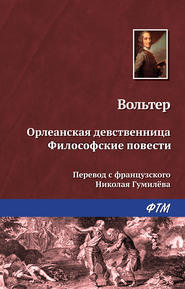По всем вопросам обращайтесь на: info@litportal.ru
(©) 2003-2024.
✖
A Philosophical Dictionary, Volume 03
Настройки чтения
Размер шрифта
Высота строк
Поля
The ingenious La Motte says of Cato, in one of his philosophical rather than poetical odes:
Caton, d'une âme plus égale,
Sous l'heureux vainqueur de Pharsale,
Eût souffert que Rome pliât;
Mais, incapable de se rendre,
Il n'eut pas la force d'attendre
Un pardon qui l'humiliât.
Stern Cato, with more equal soul,
Had bowed to Cæsar's wide control —
With Rome had to the conqueror bowed —
But that his spirit, rough and proud,
Had not the courage to await
A pardoned foe's too humbling fate.
It was, I believe, because Cato's soul was always equal, and retained to the last its love for his country and her laws that he chose rather to perish with her than to crouch to the tyrant. He died as he had lived. Incapable of surrendering! And to whom? To the enemy of Rome – to the man who had forcibly robbed the public treasury in order to make war upon his fellow-citizens and enslave them by means of their own money. A pardoned foe! It seems as if La Motte-Houdart were speaking of some revolted subject who might have obtained his majesty's pardon by letters in chancery.
It seems rather absurd to say that Cato slew himself through weakness. None but a strong mind can thus surmount the most powerful instinct of nature. This strength is sometimes that of frenzy, but a frantic man is not weak.
Suicide is forbidden amongst us by the canon law. But the decretals, which form the jurisprudence of a part of Europe, were unknown to Cato, to Brutus, to Cassius, to the sublime Arria, to the Emperor Otho, to Mark Antony, and the rest of the heroes of true Rome, who preferred a voluntary death to a life which they believed to be ignominious.
We, too, kill ourselves, but it is when we have lost our money, or in the very rare excess of foolish passion for an unworthy object. I have known women kill themselves for the most stupid men imaginable. And sometimes we kill ourselves when we are in bad health, which action is a real weakness.
Disgust with our own existence, weariness of ourselves is a malady which is likewise a cause of suicide. The remedy is a little exercise, music, hunting, the play, or an agreeable woman. The man who, in a fit of melancholy, kills himself to-day, would have wished to live had he waited a week.
I was almost an eye-witness of a suicide which deserves the attention of all cultivators of physical science. A man of a serious profession, of mature age, of regular conduct, without passions, and above indigence, killed himself on Oct. 17, 1769, and left to the town council of the place where he was born, a written apology for his voluntary death, which it was thought proper not to publish lest it should encourage men to quit a life of which so much ill is said. Thus far there is nothing extraordinary; such instances are almost every day to be met with. The astonishing part of the story is this:
His brother and his father had each killed himself at the same age. What secret disposition of organs, what sympathy, what concurrence of physical laws, occasions a father and his two sons to perish by their own hands, and by the same kind of death, precisely when they have attained such a year? Is it a disease which unfolds itself successively in the different members of a family – as we often see fathers and children die of smallpox, consumption, or any other complaint? Three or four generations have become deaf or blind, gouty or scorbutic, at a predetermined period.
Physical organization, of which moral is the offspring, transmits the same character from father to son through a succession of ages. The Appii were always haughty and inflexible, the Catos always severe. The whole line of the Guises were bold, rash, factious; compounded of the most insolent pride, and the most seductive politeness. From Francis de Guise to him who alone and in silence went and put himself at the head of the people of Naples, they were all, in figure, in courage, and in turn of mind, above ordinary men. I have seen whole length portraits of Francis de Guise, of the Balafré, and of his son: they are all six feet high, with the same features, the same courage and boldness in the forehead, the eye, and the attitude.
This continuity, this series of beings alike is still more observable in animals, and if as much care were taken to perpetuate fine races of men as some nations still take to prevent the mixing of the breeds of their horses and hounds the genealogy would be written in the countenance and displayed in the manners. There have been races of crooked and of six-fingered people, as we see red-haired, thick-lipped, long-nosed, and flat-nosed races.
But that nature should so dispose the organs of a whole race that at a certain age each individual of that family will have a passion for self-destruction – this is a problem which all the sagacity of the most attentive anatomists cannot resolve. The effect is certainly all physical, but it belongs to occult physics. Indeed, what principle is not occult?
We are not informed, nor is it likely that in, the time of Cæsar and the emperors the inhabitants of Great Britain killed themselves as deliberately as they now do, when they have the vapors which they denominate the spleen.
On the other hand, the Romans, who never had the spleen, did not hesitate to put themselves to death. They reasoned, they were philosophers, and the people of the island of Britain were not so. Now, English citizens are philosophers and Roman citizens are nothing. The Englishman quits this life proudly and disdainfully when the whim takes him, but the Roman must have an indulgentia in articulo mortis; he can neither live nor die.
Sir William Temple says that a man should depart when he has no longer any pleasure in remaining. So died Atticus. Young women who hang and drown themselves for love should then listen to the voice of hope, for changes are as frequent in love as in other affairs.
An almost infallible means of saving yourself from the desire of self-destruction is always to have something to do. Creech, the commentator on Lucretius, marked upon his manuscripts: "N.B. Must hang myself when I have finished." He kept his word with himself that he might have the pleasure of ending like his author. If he had undertaken a commentary upon Ovid he would have lived longer.
Why have we fewer suicides in the country than in the towns? Because in the fields only the body suffers; in the town it is the mind. The laborer has not time to be melancholy; none kill themselves but the idle – they who, in the eyes of the multitude, are so happy.
I shall here relate some suicides that have happened in my own time, several of which have already been published in other works. The dead may be made useful to the living:
A Brief Account of Some Singular Suicides.
Philip Mordaunt, cousin-german to the celebrated earl of Peterborough – so well known in all the European courts, and who boasted of having seen more postillions and kings than any other man – was a young man of twenty-seven, handsome, well made, rich, of noble blood, with the highest pretensions, and, which was more than all, adored by his mistress, yet Mordaunt was seized with a disgust for life. He paid his debts, wrote to his friends, and even made some verses on the occasion. He dispatched himself with a pistol without having given any other reason than that his soul was tired of his body and that when we are dissatisfied with our abode we ought to quit it. It seemed that he wished to die because he was disgusted with his good fortune.
In 1726 Richard Smith exhibited a strange spectacle to the world from a very different cause. Richard Smith was disgusted with real misfortune. He had been rich, and he was poor; he had been in health, and he was infirm; he had a wife with whom he had naught but his misery to share; their only remaining property was a child in the cradle. Richard Smith and Bridget Smith, with common consent, having embraced each other tenderly and given their infant the last kiss began with killing the poor child, after which they hanged themselves to the posts of their bed.
I do not know any other act of cold-blooded horror so striking as this. But the letter which these unfortunate persons wrote to their cousin, Mr. Brindley, before their death, is as singular as their death itself. "We believe," say they, "that God will forgive us… We quit this life because we are miserable – without resource, and we have done our only son the service of killing him, lest he should become as unfortunate as ourselves…" It must be observed that these people, after killing their son through parental tenderness, wrote to recommend their dog and cat to the care of a friend. It seems they thought it easier to make a cat and dog happy in this life than a child, and they would not be a burden to their friends.
Lord Scarborough quitted this life in 1727, with the same coolness as he had quitted his office of Master of the Horse. He was reproached, in the House of Peers, with taking the king's part because he had a good place at court. "My lords," said he, "to prove to you that my opinion is independent of my place, I resign it this moment." He afterwards found himself in a perplexing dilemma between a mistress whom he loved, but to whom he had promised nothing, and a woman whom he esteemed, and to whom he had promised marriage. He killed himself to escape from his embarrassment.
These tragical stories which swarm in the English newspapers, have made the rest of Europe think that, in England, men kill themselves more willingly than elsewhere. However, I know not but there are as many madmen or heroes to be found in Paris as in London. Perhaps, if our newspapers kept an exact list of all who had been so infatuated as to seek their own destruction, and so lamentably courageous as to effect it, we should, in this particular, have the misfortune to rival the English. But our journals are more discreet. In such of them as are acknowledged by the government private occurrences are never exposed to public slander.
All I can venture to say with assurance is that there is no reason to apprehend that this rage for self-murder will ever become an epidemical disorder. Against this, nature has too well provided. Hope and fear are the powerful agents which she often employs to stay the hand of the unhappy individual about to strike at his own breast. Cardinal Dubois was once heard to say to himself: "Kill thyself! Coward, thou darest not!"
It is said that there have been countries in which a council was established to grant the citizens permission to kill themselves when they had good and sufficient reasons. I answer either that it was not so or that those magistrates had not much to do.
It might, indeed, astonish us, and does, I think, merit a serious examination, that almost all the ancient Roman heroes killed themselves when they had lost a battle in the civil wars. But I do not find, neither in the time of the League, nor in that of the Frond, nor in the troubles of Italy, nor in those of England, that any chief thought proper to die by his own hand. These chiefs, it is true, were Christians, and there is a great difference between the principles of a Christian warrior and those of a Pagan hero. But why were these men whom Christianity restrained when they would have put themselves to death, restrained by nothing when they chose to poison, assassinate, and bring their conquered enemies to the scaffold? Does not the Christian religion forbid these murders much more than self-murder, of which the New Testament makes no mention?
The apostles of suicide tell us that it is quite allowable to quit one's house when one is tired of it. Agreed, but most men would prefer sleeping in a mean house to lying in the open air.
I once received a circular letter from an Englishman, in which he offered a prize to any one who should most satisfactorily prove that there are occasions on which a man might kill himself. I made no answer: I had nothing to prove to him. He had only to examine whether he liked better to die than to live.
Another Englishman came to me at Paris in 1724; he was ill, and promised me that he would kill himself if he was not cured by July 20. He accordingly gave me his epitaph in these words: "Valet curia!" "Farewell care!" and gave me twenty-five louis to get a small monument erected to him at the end of the Faubourg St. Martin. I returned him his money on July 20, and kept his epitaph.
In my own time the last prince of the house of Courtenai, when very old, and the last branch of Lorraine-Harcourt, when very young, destroyed themselves almost without its being heard of. These occurrences cause a terrible uproar the first day, but when the property of the deceased has been divided they are no longer talked of.
The following most remarkable of all suicides has just occurred at Lyons, in June, 1770: A young man well known, who was handsome, well made, clever, and amiable, fell in love with a young woman whom her parents would not give to him. So far we have nothing more than the opening scene of a comedy, the astonishing tragedy is to follow.
The lover broke a blood-vessel and the surgeons informed him there was no remedy. His mistress engaged to meet him, with two pistols and two daggers in order that, if the pistols missed the daggers might the next moment pierce their hearts. They embraced each other for the last time: rose-colored ribbons were tied to the triggers of the pistols; the lover holding the ribbon of his mistress's pistol, while she held the ribbon of his. Both fired at a signal given, and both fell at the same instant.
Of this fact the whole city of Lyons is witness. Pætus and Arria, you set the example, but you were condemned by a tyrant, while love alone immolated these two victims.
Laws Against Suicide.
Has any law, civil or religious, ever forbidden a man to kill himself, on pain of being hanged after death, or on pain of being damned? It is true that Virgil has said:
Proximo, deinde tenent mæsti loca, qui sibi lethum
Insontes peperere manu, lucemque perosi
Projecere animas. Quam vellent æthere in alto
Nunc et pauperiem et duros perferre labores!
Fata obstant, tristique palus inamabilis unda
Alligat, et novies Styx interfusa coercet.
– ÆNEIS, lib. vi. v. 434 et seq.
The next in place, and punishment, are they
Who prodigally throw their souls away —
Fools, who repining at their wretched state,
And loathing anxious life, suborn their fate;
With late repentance now they would retrieve
The bodies they forsook, and wish to live;
Their pains and poverty desire to bear,















